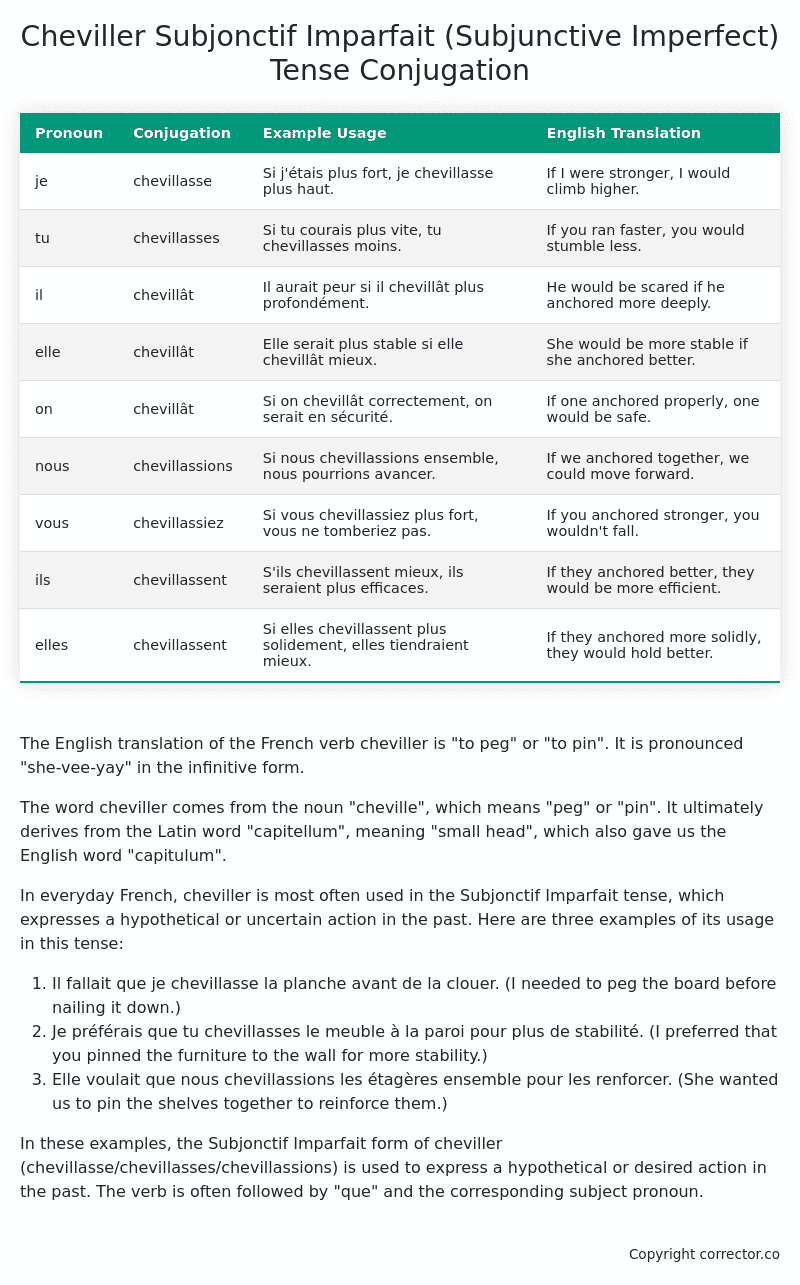Subjonctif Imparfait (Subjunctive Imperfect) Tense Conjugation of the French Verb cheviller
Introduction to the verb cheviller
The English translation of the French verb cheviller is “to peg” or “to pin”. It is pronounced “she-vee-yay” in the infinitive form.
The word cheviller comes from the noun “cheville”, which means “peg” or “pin”. It ultimately derives from the Latin word “capitellum”, meaning “small head”, which also gave us the English word “capitulum”.
In everyday French, cheviller is most often used in the Subjonctif Imparfait tense, which expresses a hypothetical or uncertain action in the past. Here are three examples of its usage in this tense:
- Il fallait que je chevillasse la planche avant de la clouer. (I needed to peg the board before nailing it down.)
- Je préférais que tu chevillasses le meuble à la paroi pour plus de stabilité. (I preferred that you pinned the furniture to the wall for more stability.)
- Elle voulait que nous chevillassions les étagères ensemble pour les renforcer. (She wanted us to pin the shelves together to reinforce them.)
In these examples, the Subjonctif Imparfait form of cheviller (chevillasse/chevillasses/chevillassions) is used to express a hypothetical or desired action in the past. The verb is often followed by “que” and the corresponding subject pronoun.
Table of the Subjonctif Imparfait (Subjunctive Imperfect) Tense Conjugation of cheviller
| Pronoun | Conjugation | Example Usage | English Translation |
|---|---|---|---|
| je | chevillasse | Si j’étais plus fort, je chevillasse plus haut. | If I were stronger, I would climb higher. |
| tu | chevillasses | Si tu courais plus vite, tu chevillasses moins. | If you ran faster, you would stumble less. |
| il | chevillât | Il aurait peur si il chevillât plus profondément. | He would be scared if he anchored more deeply. |
| elle | chevillât | Elle serait plus stable si elle chevillât mieux. | She would be more stable if she anchored better. |
| on | chevillât | Si on chevillât correctement, on serait en sécurité. | If one anchored properly, one would be safe. |
| nous | chevillassions | Si nous chevillassions ensemble, nous pourrions avancer. | If we anchored together, we could move forward. |
| vous | chevillassiez | Si vous chevillassiez plus fort, vous ne tomberiez pas. | If you anchored stronger, you wouldn’t fall. |
| ils | chevillassent | S’ils chevillassent mieux, ils seraient plus efficaces. | If they anchored better, they would be more efficient. |
| elles | chevillassent | Si elles chevillassent plus solidement, elles tiendraient mieux. | If they anchored more solidly, they would hold better. |
Other Conjugations for Cheviller.
Le Present (Present Tense) Conjugation of the French Verb cheviller
Imparfait (Imperfect) Tense Conjugation of the French Verb cheviller
Passé Simple (Simple Past) Tense Conjugation of the French Verb cheviller
Passé Composé (Present Perfect) Tense Conjugation of the French Verb cheviller
Futur Simple (Simple Future) Tense Conjugation of the French Verb cheviller
Futur Proche (Near Future) Tense Conjugation of the French Verb cheviller
Plus-que-parfait (Pluperfect) Tense Conjugation of the French Verb cheviller
Passé Antérieur (Past Anterior) Tense Conjugation of the French Verb cheviller
Futur Antérieur (Future Anterior) Tense Conjugation of the French Verb cheviller
Subjonctif Présent (Subjunctive Present) Tense Conjugation of the French Verb cheviller
Subjonctif Passé (Subjunctive Past) Tense Conjugation of the French Verb cheviller
Subjonctif Imparfait (Subjunctive Imperfect) Tense Conjugation of the French Verb cheviller (this article)
Subjonctif Plus-que-parfait (Subjunctive Pluperfect) Tense Conjugation of the French Verb cheviller
Conditionnel Présent (Conditional Present) Tense Conjugation of the French Verb cheviller
Conditionnel Passé (Conditional Past) Tense Conjugation of the French Verb cheviller
L’impératif Présent (Imperative Present) Tense Conjugation of the French Verb cheviller
L’infinitif Présent (Infinitive Present) Tense Conjugation of the French Verb cheviller
Struggling with French verbs or the language in general? Why not use our free French Grammar Checker – no registration required!
Get a FREE Download Study Sheet of this Conjugation 🔥
Simply right click the image below, click “save image” and get your free reference for the cheviller Subjonctif Imparfait tense conjugation!

Cheviller – About the French Subjonctif Imparfait (Subjunctive Imperfect) Tense
Formation
Common Everyday Usage Patterns
Interactions with Other Tenses
Subjonctif Présent
Indicatif Passé Composé
Conditional
Conditional Perfect
Summary
I hope you enjoyed this article on the verb cheviller. Still in a learning mood? Check out another TOTALLY random French verb conjugation!


